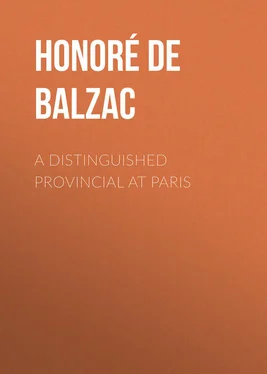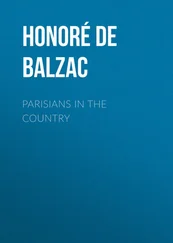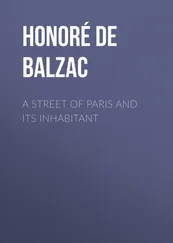Honoré Balzac - A Distinguished Provincial at Paris
Здесь есть возможность читать онлайн «Honoré Balzac - A Distinguished Provincial at Paris» — ознакомительный отрывок электронной книги совершенно бесплатно, а после прочтения отрывка купить полную версию. В некоторых случаях можно слушать аудио, скачать через торрент в формате fb2 и присутствует краткое содержание. Жанр: literature_19, foreign_antique, foreign_prose, на английском языке. Описание произведения, (предисловие) а так же отзывы посетителей доступны на портале библиотеки ЛибКат.
- Название:A Distinguished Provincial at Paris
- Автор:
- Жанр:
- Год:неизвестен
- ISBN:нет данных
- Рейтинг книги:4 / 5. Голосов: 1
-
Избранное:Добавить в избранное
- Отзывы:
-
Ваша оценка:
- 80
- 1
- 2
- 3
- 4
- 5
A Distinguished Provincial at Paris: краткое содержание, описание и аннотация
Предлагаем к чтению аннотацию, описание, краткое содержание или предисловие (зависит от того, что написал сам автор книги «A Distinguished Provincial at Paris»). Если вы не нашли необходимую информацию о книге — напишите в комментариях, мы постараемся отыскать её.
A Distinguished Provincial at Paris — читать онлайн ознакомительный отрывок
Ниже представлен текст книги, разбитый по страницам. Система сохранения места последней прочитанной страницы, позволяет с удобством читать онлайн бесплатно книгу «A Distinguished Provincial at Paris», без необходимости каждый раз заново искать на чём Вы остановились. Поставьте закладку, и сможете в любой момент перейти на страницу, на которой закончили чтение.
Интервал:
Закладка:
At length the Baron saw Lucien, and favored him with a cool, disparaging little nod, indicative to men of the world of the recipient’s inferior station. A sardonic expression accompanied the greeting, “How does he come here?” he seemed to say. This was not lost on those who saw it; for de Marsay leaned towards Montriveau, and said in tones audible to Chatelet:
“Do ask him who the queer-looking young fellow is that looks like a dummy at a tailor’s shop-door.”
Chatelet spoke a few words in his traveling companion’s ear, and while apparently renewing his acquaintance, no doubt cut his rival to pieces.
If Lucien was surprised at the apt wit and the subtlety with which these gentlemen formulated their replies, he felt bewildered with epigram and repartee, and, most of all, by their offhand way of talking and their ease of manner. The material luxury of Paris had alarmed him that morning; at night he saw the same lavish expenditure of intellect. By what mysterious means, he asked himself, did these people make such piquant reflections on the spur of the moment, those repartees which he could only have made after much pondering? And not only were they at ease in their speech, they were at ease in their dress, nothing looked new, nothing looked old, nothing about them was conspicuous, everything attracted the eyes. The fine gentleman of to-day was the same yesterday, and would be the same to-morrow. Lucien guessed that he himself looked as if he were dressed for the first time in his life.
“My dear fellow,” said de Marsay, addressing Felix de Vandenesse, “that young Rastignac is soaring away like a paper-kite. Look at him in the Marquise de Listomere’s box; he is making progress, he is putting up his eyeglass at us! He knows this gentleman, no doubt,” added the dandy, speaking to Lucien, and looking elsewhere.
“He can scarcely fail to have heard the name of a great man of whom we are proud,” said Mme. de Bargeton. “Quite lately his sister was present when M. de Rubempre read us some very fine poetry.”
Felix de Vandenesse and de Marsay took leave of the Marquise d’Espard, and went off to Mme. de Listomere, Vandenesse’s sister. The second act began, and the three were left to themselves again. The curious women learned how Mme. de Bargeton came to be there from some of the party, while the others announced the arrival of a poet, and made fun of his costume. Canalis went back to the Duchesse de Chaulieu, and no more was seen of him.
Lucien was glad when the rising of the curtain produced a diversion. All Mme. de Bargeton’s misgivings with regard to Lucien were increased by the marked attention which the Marquise d’Espard had shown to Chatelet; her manner towards the Baron was very different from the patronizing affability with which she treated Lucien. Mme. de Listomere’s box was full during the second act, and, to all appearance, the talk turned upon Mme. de Bargeton and Lucien. Young Rastignac evidently was entertaining the party; he had raised the laughter that needs fresh fuel every day in Paris, the laughter that seizes upon a topic and exhausts it, and leaves it stale and threadbare in a moment. Mme. d’Espard grew uneasy. She knew that an ill-natured speech is not long in coming to the ears of those whom it will wound, and waited till the end of the act.
After a revulsion of feeling such as had taken place in Mme. de Bargeton and Lucien, strange things come to pass in a brief space of time, and any revolution within us is controlled by laws that work with great swiftness. Chatelet’s sage and politic words as to Lucien, spoken on the way home from the Vaudeville, were fresh in Louise’s memory. Every phrase was a prophecy, it seemed as if Lucien had set himself to fulfil the predictions one by one. When Lucien and Mme. de Bargeton had parted with their illusions concerning each other, the luckless youth, with a destiny not unlike Rousseau’s, went so far in his predecessor’s footsteps that he was captivated by the great lady and smitten with Mme. d’Espard at first sight. Young men and men who remember their young emotions can see that this was only what might have been looked for. Mme. d’Espard with her dainty ways, her delicate enunciation, and the refined tones of her voice; the fragile woman so envied, of such high place and high degree, appeared before the poet as Mme. de Bargeton had appeared to him in Angouleme. His fickle nature prompted him to desire influence in that lofty sphere at once, and the surest way to secure such influence was to possess the woman who exerted it, and then everything would be his. He had succeeded at Angouleme, why should he not succeed in Paris?
Involuntarily, and despite the novel counter fascination of the stage, his eyes turned to the Celimene in her splendor; he glanced furtively at her every moment; the longer he looked, the more he desired to look at her. Mme. de Bargeton caught the gleam in Lucien’s eyes, and saw that he found the Marquise more interesting than the opera. If Lucien had forsaken her for the fifty daughters of Danaus, she could have borne his desertion with equanimity; but another glance – bolder, more ardent and unmistakable than any before – revealed the state of Lucien’s feelings. She grew jealous, but not so much for the future as for the past.
“He never gave me such a look,” she thought. “Dear me! Chatelet was right!”
Then she saw that she had made a mistake; and when a woman once begins to repent of her weaknesses, she sponges out the whole past. Every one of Lucien’s glances roused her indignation, but to all outward appearance she was calm. De Marsay came back in the interval, bringing M. de Listomere with him; and that serious person and the young coxcomb soon informed the Marquise that the wedding guest in his holiday suit, whom she had the bad luck to have in her box, had as much right to the appellation of Rubempre as a Jew to a baptismal name. Lucien’s father was an apothecary named Chardon. M. de Rastignac, who knew all about Angouleme, had set several boxes laughing already at the mummy whom the Marquise styled her cousin, and at the Marquise’s forethought in having an apothecary at hand to sustain an artificial life with drugs. In short, de Marsay brought a selection from the thousand-and-one jokes made by Parisians on the spur of the moment, and no sooner uttered than forgotten. Chatelet was at the back of it all, and the real author of this Punic faith.
Mme. d’Espard turned to Mme. de Bargeton, put up her fan, and said, “My dear, tell me if your protege’s name is really M. de Rubempre?”
“He has assumed his mother’s name,” said Anais, uneasily.
“But who was his father?”
“His father’s name was Chardon.”
“And what was this Chardon?”
“A druggist.”
“My dear friend, I felt quite sure that all Paris could not be laughing at any one whom I took up. I do not care to stay here when wags come in in high glee because there is an apothecary’s son in my box. If you will follow my advice, we will leave it, and at once.”
Mme. d’Espard’s expression was insolent enough; Lucien was at a loss to account for her change of countenance. He thought that his waistcoat was in bad taste, which was true; and that his coat looked like a caricature of the fashion, which was likewise true. He discerned, in bitterness of soul, that he must put himself in the hands of an expert tailor, and vowed that he would go the very next morning to the most celebrated artist in Paris. On Monday he would hold his own with the men in the Marquise’s house.
Yet, lost in thought though he was, he saw the third act to an end, and, with his eyes fixed on the gorgeous scene upon the stage, dreamed out his dream of Mme. d’Espard. He was in despair over her sudden coldness; it gave a strange check to the ardent reasoning through which he advanced upon this new love, undismayed by the immense difficulties in the way, difficulties which he saw and resolved to conquer. He roused himself from these deep musings to look once more at his new idol, turned his head, and saw that he was alone; he had heard a faint rustling sound, the door closed – Madame d’Espard had taken her cousin with her. Lucien was surprised to the last degree by the sudden desertion; he did not think long about it, however, simply because it was inexplicable.
Читать дальшеИнтервал:
Закладка:
Похожие книги на «A Distinguished Provincial at Paris»
Представляем Вашему вниманию похожие книги на «A Distinguished Provincial at Paris» списком для выбора. Мы отобрали схожую по названию и смыслу литературу в надежде предоставить читателям больше вариантов отыскать новые, интересные, ещё непрочитанные произведения.
Обсуждение, отзывы о книге «A Distinguished Provincial at Paris» и просто собственные мнения читателей. Оставьте ваши комментарии, напишите, что Вы думаете о произведении, его смысле или главных героях. Укажите что конкретно понравилось, а что нет, и почему Вы так считаете.












